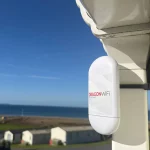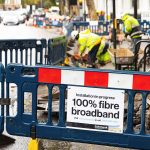As Funding Deal Looms, CityFibre Says Talk of Sale to VMO2 Unfounded

Network operator CityFibre, which has so far deployed their gigabit-capable full fibre broadband (FTTP) lines to cover 4.3 million UK premises (RFS), have said that recent newspaper “speculation” around the possibility of the business being acquired by Virgin Media (O2) are “unfounded“. The operator added that they were now close to securing a much-needed financing deal.
Just to recap. CityFibre currently still aspires to cover up to 8 million UK premises with their new FTTP (XGS-PON) broadband network – representing c.30% of the UK. But their original target of hitting that by the end of 2025 will not be achieved, and the operator has instead shifted their strategy to focus more on growth via mergers and acquisition (M&A) of smaller alternative networks (e.g. the deal to acquire Connexin – here, as well as Lit Fibre before that).
Like so many other network operators, CityFibre is also under pressure from high interest rates, rising build costs and competition, which has already impacted some of their commercial deployments. This tends to make it more of a challenge to raise fresh investment, too. On top of that, one of the operator’s key ISP partners, TalkTalk (accounting for c.150k CityFibre customers), is struggling in ways that could risk wider harm in the future (here).
Advertisement
Despite this, reports from earlier this year had indicated that CityFibre were working toward securing a crucial c.£1.5bn financing package, which was said to reflect a £500m equity financing deal with existing investors (here) and around £1bn of incremental debt funding – roughly enough liquidity to keep them fuelled through to mid-2027 and to support their M&A drive. But that deal has yet to emerge.
The latest development sees the Telegraph reporting that two of CityFibre’s major investors (Mubadala and Goldman Sachs), as well as some of their lenders, have in recent months approached the parents of Virgin Media and O2 (i.e. Liberty Global and Telefonica) to discuss options, including a potential sale (perhaps not for the first time). But the alleged exploratory talks didn’t go very far and are not thought to be ongoing.
A CityFibre spokesman said:
“Any speculation about a potential sale is unfounded. CityFibre is in a strong position and we expect to announce details of our financing shortly, supporting our role in consolidating the sector and accelerating CityFibre’s next phase of growth.”
Crucially, the company’s shareholders have also issued a statement, which says they “remain committed to CityFibre’s long-term success and are actively engaged in supporting the company’s next phase of growth“. ISPreview’s own sources have similarly indicated that the future financing deal could end up being worth more than £1.5bn and is expected to be agreed in the next few weeks, before the end of July (existing funding is due to run out around mid-2025).
According to a previous note from analyst James Ratzer, in 2025 and beyond, it’s expected that CityFibre will likely only build FTTP out c.300k homes per annum organically, largely to fulfil their Project Gigabit contracts. But the operator still aspires to add around 1 million premises each year, which suggest c.700,000 will be coming from M&A deals (c.100k – 185k of this was covered by the Connexin deal).
Advertisement
The catch is that consolidating alternative networks tends to be a slow, complex and often costly process – particularly with many altnets still harbouring an inflated idea of their own asset values. CityFibre’s strategy around it is thus still somewhat unproven, although most industry observers expect to see more consolidation, which only becomes more likely as other altnets begin running out of funding.
Finally, the idea of an acquisition by VMO2 and nexfibre’s parents also seems highly questionable, not least due to the high level of overbuild between the networks. Not to mention that VMO2 and nexfibre’s network expansion, as well as their wholesale plans, seem to have taken a hit after debt-laden Telefónica began a strategic review of their business (here and here). But Liberty Global does still see UK consolidation as a strategy they may pursue, with other operators.
Mark is a professional technology writer, IT consultant and computer engineer from Dorset (England), he also founded ISPreview in 1999 and enjoys analysing the latest telecoms and broadband developments. Find me on X (Twitter), Mastodon, Facebook, BlueSky, Threads.net and Linkedin.
« Boldyn Networks and ITS Tech to Build New Full Fibre Networks in London






















































Enter COMCAST in the guise of Sky.
I think Comcast is not in the picture, given the efforts being made to turn around the business and boost organic growth. They have also seen the value of their Sky acquisition written down by 25pc, and losses at the unit continue to climb. Buying an indebted business to boost another failing business unit that is operating in declining (linear TV) and highly competitive (streaming and broadband) market segments might get a poor reception internally.
I shudder at the thought of this. I have recently left Sky and they have sent me an email before my final bill telling me I must pay or return to Sky, or they will send my details to a debt collector. I have nothing to pay and they have yet to send me a final bill so I find their whole approach just downright wrong. I’m glad to be away from them.
@RIK
that will be for your hardware i.e Sky Q box, they still own anything they send you, its in the T&C’s
I doubt VM02 will be attempting any kind of takeover while Telefonica is tied up in an internal review of strategy.
As to a takeover of CityFibre, I would expect Vodafone to be the more likely predator; however, it will have its work cut out for the next three to four years at least digesting the Three acquisition. There might, however, be an opportunity at this time for Vodafone to acquire a small holding in CityFibre that might prove mutually beneficial.
Comcast are a far better bet than VMO2, but CityFibre will get the refinancing done and then you’ll see a splurge of M&A taking a third network to about 6/7m by 2027. Then you’ll see the sale happen.
I do not think UK broadband customers would want to see Comcast’s reputed business practices spread to the UK. Comcast has enough on It’s plate with the core business while Liberty Global is still intent on investing in its UK businesses.
They’ll probably get the money they’re seeking thanks to sunk cost fallacy but look an awful lot like the next Thames Water.
Nearly run out of cash, allegedly, having built 4.3 million premises RFS and raised £7.3 billion isn’t exactly a clear sign of strength. Nor is still raising cash this close to running out.
Interest payments are relatively low but the debt gets refinanced in 2027. Interest rates are way higher now.
See how long the investors keep propping them up for and how cheaply they can acquire. It’ll certainly be for a lot less than the £1,650 they’ve spent per premises RFS right now.
Might be turned around in time. Might end up with the bond holders owning everything and big write downs for the investors. One of those outcomes is more likely than the other: see how much for how long investors and lenders wish to put into here.
£1170 according to Richard Tang during his “Full Fibre Wacky Races Part Five” address to LINX. Video Well worth a watch here:- https://youtu.be/vSkx3R8h6gI?t=4
@Big-Dave: Thanks.
Total spent is a better metric than construction cost which is I presume that number.
Can build for £300 per premises but if you build so slowly your operational costs and interest payments are adding up it is more painful.
Divide premises RFS by total cash spent for the number I mentioned.
Though quite different from how Thames Water got into a mess, which was by borrowing large amounts secured against its asset base so as to pay dividends to its shareholders… a ‘strategy’ which has all come fully undone as a result of rising interest rates.
Plus, CityFibre is ultimately a ‘nice to have’, Thames Water – or rather the services it provides to 15.5 million people – is somewhat more than that!
Is that spend per RFS based on just the spend on broadband fibre rollout or is it inclusive of the spend in all the sectors CityFibre is involved in?
Why not sell part of it to city group it would make sense in name and this will will make the uae look good and Will benfit city fibres builds
After many false dawns and near misses, I assume they’ll never get to me now (all local build activity has stopped, again). Shame, as the CityFibre service offerings from many providers are much cheaper than Openreach equivalents. But I’ll just be thankful when /anyone/ finally gets to us now, in our fibre desert.
Altnets are cheaper than Openreach and VM because they’re operating at a loss to attract customers. In the next few yeas, as the FTTP build nears completion, prices will converge.
“[…] particularly with many altnets still harbouring an inflated idea of their own asset values.”
Quite!
Or to put it another way, they don’t want to sell for less than has been invested in them. I think its going to take a few altnets going bankrupt to focus minds and force them to accept a realistic price.
A couple of people getting their fingers burnt could just be what’s needed to restore a bit of sanity to the sector.
That’s not surprising they’re in debt.
In eg. Portsmouth they have dug their cables in, put distribution cabinets along whole London Road (main street), but numbers of connections to houses can be counted on two hands… They claim most of city is connected, while in fact only in particular streets it’s true.
people seem to forget cityfibre kickstarted the legacy companies bt and vm into upgrading, they wanted to sell everyone a product called fibre that wasnt(there should be ppi type scandal in the future on that one) a huge infrastructure like cityfibre doesnt turn into profit over 5 10 or 15 years, they will restructure continuously for years to come , m and a will dictate where the smaller altenets end up but its looking increasingly clear that cityfibre will be the 2nd biggest fibre network and the 3rd biggest network overall and those who didnt get captured from stalled builds will perhaps be captured when costs dictate its effective to do so, united kingdom should thank them for the choice and competition thats in the market, as for costs they simply operate at a fraction of bt and vm costs, hence bt are slashing 60000 jobs, when bt have fibre everywhere and get about removing there copper network, after that they will have infrastuctre asset that costs less to maintain and operate and maybe they can bring prices down
CityFibre was founded in 2011. BT had determined much of the architecture of a network that would meet its needs by the mid 90s and started rolling out optical fibre on a larger scale in 2004, into the local loop in 2009.
And immediately mis-sold that network to consumers , people shouldn’t question altnet competitive pricing and should be asking why openreach/bt have taken them for a ride for so long .
No one is questioning AltNet pricing; they are stating the facts. You might want to listen to what the industry is saying about the market, including some of the comments coming from the “AltNets”.
Big Dave shared this video a few days ago which you might find informative:
https://www.youtube.com/watch?v=vSkx3R8h6gI